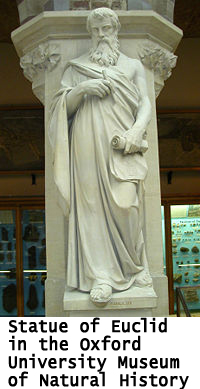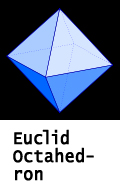Geometry
The math subject that some folks just love to hate, was “created” by Euclid. He lived somewhere around 300 B.C.E., and was also know of as Euclid of Alexandria. He was a Greek mathematician, often referred to as the “Father of Geometry”. 
He was active in Alexandria during the reign of Ptolemy I (323–283 B.C.E.). His Elements is one of the most influential works in the history of mathematics, serving as the main textbook for teaching mathematics (especially geometry) from the time of its publication until the late 19th or early 20th century.
In the Elements, Euclid deduced the principles of what is now called Euclidean geometry from a small set of axioms. Euclid also wrote works on perspective, conic sections, spherical geometry, number theory and rigor.
King Tries To Find A Short Cut To Understanding Geometry
Little is known about Euclid’s life, as there are only a handful of references to him. The date and place of Euclid’s birth and the date and circumstances of his death are unknown, and only roughly estimated in proximity to contemporary figures mentioned in references.
The few historical references to Euclid were written centuries after he lived, by Proclus and Pappus of Alexandria. Proclus introduces Euclid only briefly in his fifth-century Commentary on the Elements, as the author of Elements, that he was mentioned by Archimedes, and that when King Ptolemy asked if there was a shorter path to learning geometry than Euclid’s Elements, Euclid replied, “There is no royal road to geometry.”
Although the purported citation of Euclid by Archimedes has been judged to be an interpolation by later editors of his works, it is still believed that Euclid wrote his works before those of Archimedes.
In addition, the “royal road” anecdote is questionable since it is similar to a story told about Menaechmus and Alexander the Great.
In the only other key reference to Euclid, Pappus briefly mentioned in the fourth century that Apollonius “spent a very long time with the pupils of Euclid at Alexandria, and it was thus that he acquired such a scientific habit of thought.”
Euclidean and Non-Euclidean Geometry
Although many of the results in Elements originated with earlier mathematicians, one of Euclid’s accomplishments was to present them in a single, logically coherent framework, making it easy to use and easy to reference, including a system of rigorous mathematical proofs that remains the basis of mathematics 23 centuries later.
There is no mention of Euclid in the earliest remaining copies of the Elements, and most of the copies say they are “from the edition of Theon” or the “lectures of Theon”, while the text considered to be primary, held by the Vatican, mentions no author. The only reference that historians rely on of Euclid having written the Elements was from Proclus, who briefly in his Commentary on the Elements ascribes Euclid as its author.
 Although best known for its geometric results, the Elements also includes number theory. It considers the connection between perfect numbers and Mersenne primes, the infinitude of prime numbers, Euclid’s lemma on factorization (which leads to the fundamental theorem of arithmetic on uniqueness of prime factorizations), and the Euclidean algorithm for finding the greatest common divisor of two numbers.
Although best known for its geometric results, the Elements also includes number theory. It considers the connection between perfect numbers and Mersenne primes, the infinitude of prime numbers, Euclid’s lemma on factorization (which leads to the fundamental theorem of arithmetic on uniqueness of prime factorizations), and the Euclidean algorithm for finding the greatest common divisor of two numbers.
The geometrical system described in the Elements was long known simply as geometry, and was considered to be the only geometry possible. Today, however, that system is often referred to as Euclidean geometry to distinguish it from other so-called non-Euclidean geometries that mathematicians discovered in the 19th century.
Are You Good At Math?
Never mind, really. Whether or not you are good at math is not the point. The point is – what are you doing to make your mark upon your time here on earth? You don’t need to write a math text book that lasts for centuries.
But you need to do something wherein you feel as if you have made a significant contribution. Get to it.
Source: Wikipedia.org (Please donate to this fine resource.)
Related articles
- Euclid of Alexandria (travelingturquoisemaven.wordpress.com)
- More on Math (romanceofvictory.wordpress.com)
- Geometry skills are innate (geometrija.wordpress.com)
- Standing Outside the Universe (ashesblog.com)